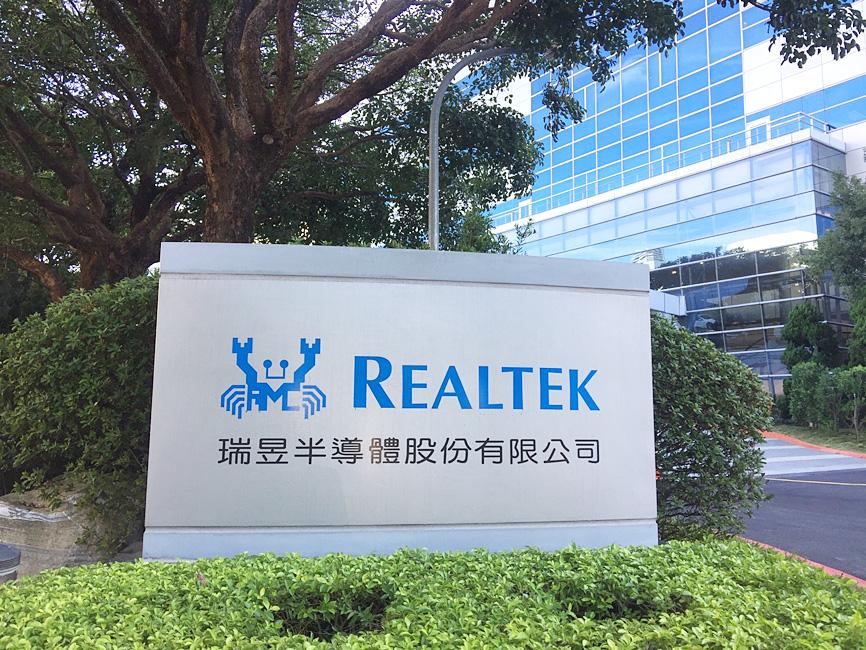Networking chip supplier Realtek Semiconductor Corp (瑞昱半導體) yesterday posted a record high net profit for the first quarter of the year, as exuberant demand for chips used in commercial PCs and Internet infrastructure offset slack demand for consumer electronics and chromebooks for students.
The Hsinchu-based chipmaker expects the uptrend to extend into this quarter, despite COVID-19 lockdowns in China that have snarled logistics and halted factories’ operations.
“Overall, demand looks very resilient in the short term. We are cautiously optimistic about the second quarter,” Realtek spokesman Huang Yee-wei (黃依瑋) told an online investors’ conference.

Photo: Hung You-fong, Taipei Times
The company is seeing strong growth momentum for its Ethernet chips and switch controllers this quarter as it benefits from network upgrades, Huang said.
There are no signs indicating a slowdown, he said.
The lockdowns in Shanghai have led to logistical issues and longer delivery times, but the curbs have so far not depressed demand, he added.
A growing number of companies are likely to join Taiwan Semiconductor Manufacturing Co (台積電) and ASE Technology Holding Co (日月光投控), a chip testing and packaging services provider, and reopen their Chinese operations after receiving approval from the Shanghai government, Huang said.
The company is monitoring the situation in Ukraine, China COVID-19 infections and high inflation worldwide, which could weaken demand in the long term, he said.
While scarcity of semiconductors remains a bottleneck, Realtek has added more foundry partners, but it does not expect to see a significant improvement in supply any time soon, he added.
“Based on our current observations, there is little change compared with what we saw three months ago. Chip shortages will not be resolved in the short term,” Huang said. “We are still facing pressure from further price increases [by foundry partners], but the hikes should be less steep than last year.”
Realtek posted a net profit of NT$5.19 billion (US$177.4 million) for the first quarter of the year, an increase of 69.8 percent from NT$3.06 billion in the same period last year.
On a quarterly basis, net profit rose 12.6 percent from NT$4.61 billion.
Earnings per share climbed to NT$10.15 from NT$5.98 a year earlier and NT$9.02 a quarter earlier.
Gross margin rose to 52.2 percent from 44.8 percent in the first quarter last year, but declined from 52.9 percent in the final quarter last year.
Revenue grew 27.5 percent year-on-year, or 8.7 percent quarter-on-quarter, to NT$29.76 billion, an all-time high.

KEEPING UP: The acquisition of a cleanroom in Taiwan would enable Micron to increase production in a market where demand continues to outpace supply, a Micron official said Micron Technology Inc has signed a letter of intent to buy a fabrication site in Taiwan from Powerchip Semiconductor Manufacturing Corp (力積電) for US$1.8 billion to expand its production of memory chips. Micron would take control of the P5 site in Miaoli County’s Tongluo Township (銅鑼) and plans to ramp up DRAM production in phases after the transaction closes in the second quarter, the company said in a statement on Saturday. The acquisition includes an existing 12 inch fab cleanroom of 27,871m2 and would further position Micron to address growing global demand for memory solutions, the company said. Micron expects the transaction to

Vincent Wei led fellow Singaporean farmers around an empty Malaysian plot, laying out plans for a greenhouse and rows of leafy vegetables. What he pitched was not just space for crops, but a lifeline for growers struggling to make ends meet in a city-state with high prices and little vacant land. The future agriculture hub is part of a joint special economic zone launched last year by the two neighbors, expected to cost US$123 million and produce 10,000 tonnes of fresh produce annually. It is attracting Singaporean farmers with promises of cheaper land, labor and energy just over the border.

US actor Matthew McConaughey has filed recordings of his image and voice with US patent authorities to protect them from unauthorized usage by artificial intelligence (AI) platforms, a representative said earlier this week. Several video clips and audio recordings were registered by the commercial arm of the Just Keep Livin’ Foundation, a non-profit created by the Oscar-winning actor and his wife, Camila, according to the US Patent and Trademark Office database. Many artists are increasingly concerned about the uncontrolled use of their image via generative AI since the rollout of ChatGPT and other AI-powered tools. Several US states have adopted

A proposed billionaires’ tax in California has ignited a political uproar in Silicon Valley, with tech titans threatening to leave the state while California Governor Gavin Newsom of the Democratic Party maneuvers to defeat a levy that he fears would lead to an exodus of wealth. A technology mecca, California has more billionaires than any other US state — a few hundred, by some estimates. About half its personal income tax revenue, a financial backbone in the nearly US$350 billion budget, comes from the top 1 percent of earners. A large healthcare union is attempting to place a proposal before